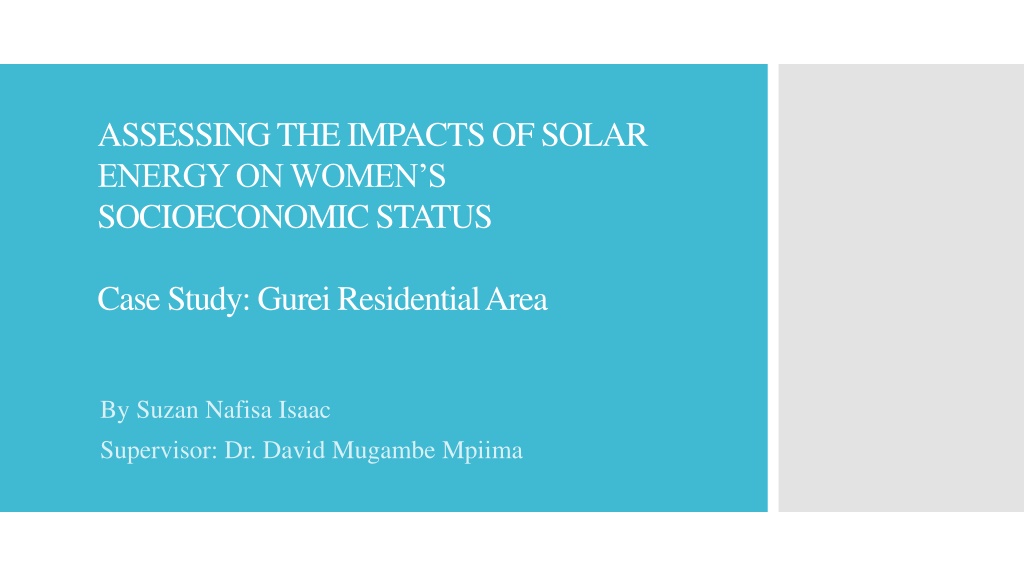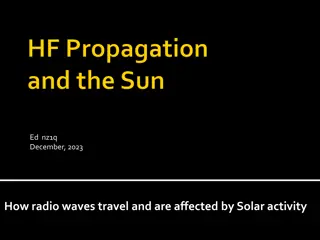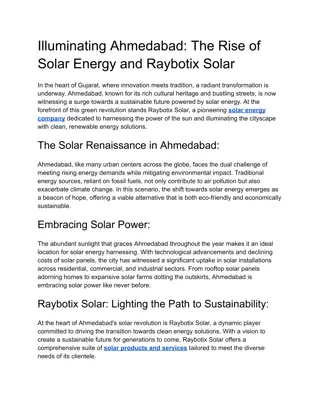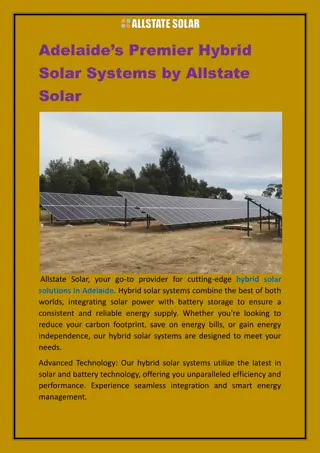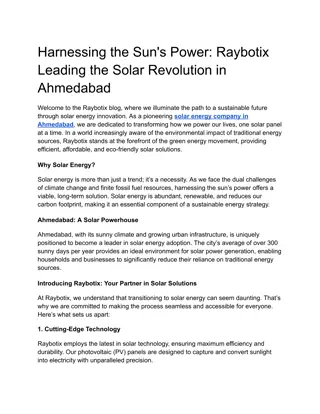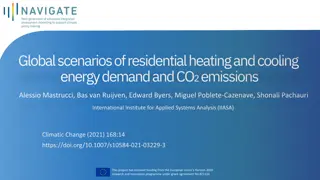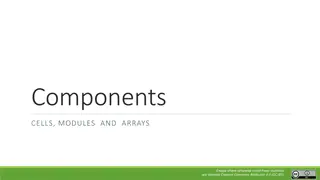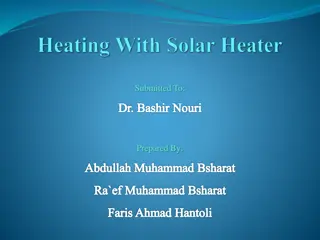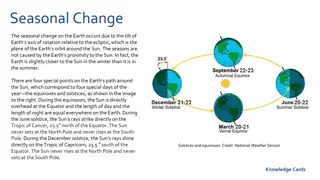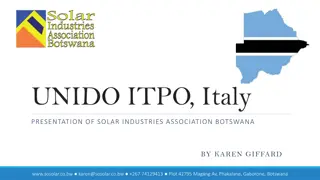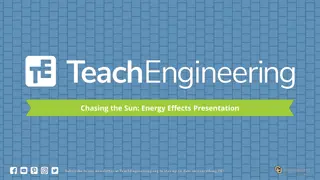Impacts of Solar Energy on Women's Socioeconomic Status: Case Study in Gurei Residential Area
Globally, women face challenges due to lack of access to modern energy, impacting their socioeconomic status. This research in Gurei, South Sudan, aims to assess the effects of solar energy on women's lives, addressing issues of clean energy access, cultural barriers, and women's involvement in the solar sector. Using qualitative methodology, the study focuses on understanding the perspectives of women in Nyarkenyi Payam, Juba County.
Download Presentation

Please find below an Image/Link to download the presentation.
The content on the website is provided AS IS for your information and personal use only. It may not be sold, licensed, or shared on other websites without obtaining consent from the author. Download presentation by click this link. If you encounter any issues during the download, it is possible that the publisher has removed the file from their server.
E N D
Presentation Transcript
ASSESSING THE IMPACTS OF SOLAR ENERGY ON WOMEN S SOCIOECONOMIC STATUS Case Study: Gurei Residential Area By Suzan Nafisa Isaac Supervisor: Dr. David Mugambe Mpiima
Women globally face the greatest burden of not having access to modern energy. They are the very group walking for long hours to collect fire fuel and are the ones ingesting harmful air pollution from kerosene/firewood as they cook. The World Bank reports that a billion people live their lives without electricity (Calderwood, 2019), and about 3 million people lack access to clean-cooking solutions and are exposed to dangerous levels of air pollution (WHO, 2021). Underrepresentation of women globally in the energy sector for example, only 32% (IRENA, 2019). And 26.3% of the solar workforce are women according to the Solar Foundation report of 2018 (Symmonds & Kenuckey, 2022). Introduction
A lot of South Sudanese lack access to clean energy and most of these are women. The women walk for long hours to secure fuel woods , and this makes them lose a lot of opportunities. According to UNOCHA, 6.1 million people have either inadequate or lack of access to clean energy, and 50-54% of these are women (UNOCHA, 2022). The country s access to energy is very low as only 22,000 households are connected to the local grids, represented by 1% (IRENA, 2021). The country largely depends on bioenergy yet it has the capacity to install and distribute solar energy both within the city and the rural areas since South Sudan has an ample sunshine. Therefore, assessing the impacts of solar energy will help in recommending solutions towards enabling women have access to clean energy and opportunities in the solar sector. Motivation/ Research Problem
General Objective; To assess the impacts of solar energy on women s socioeconomic status in Gurei Residential Area (Nyarkenyi Payam) Juba County, South Sudan. Specific Objectives; To determine the impacts of solar energy on women s socioeconomic status in Gurei Residential area (Nyarkenyi Payam) Juba County, South Sudan. To examine socio-cultural factors affecting women from accessing solar energy services in Gurei Residential area (Nyarkenyi Payam) Juba County, South Sudan. To Assess the influence women make in the solar energy sector in Gurei Residential area (Nyarkenyi Payam) Juba County, South Sudan. General Objective & Specific Objectives
This research will use a qualitative research methodology, because a qualitative research focuses on interpreting and understanding the respondents who have accepted to participate in the study, and also seeks an answer to How and Why something is done. Research approach, the approach will be an inductive since this allows the researcher to interact with the researchee (that person being researched). Study design, this study will use a case study research design, because it uses observations and interviews to draw information from multiple sources in order to understand and gain concrete, contextual, in-depth knowledge about the research topic. Study area/site, the study will be carried out in Gurei residential area (Nyarkenyi Payam) Juba county, South Sudan. Methodology
Study population, this study will focus on women residing in Gurei Residential area especially in homes with rooftop solar panels, SunGate Solar Company Ltd and key local leaders working in the oil and gas industry. Data collection methods, this research will use semi- structured interview method (one-on-one interviews), observations to collect the information needed. Data analysis, this data will be analyzed using content analysis as it involves discussing the meaning of words, phrases and sentences of the data collected and then identify common themes. Methodology Cont d.
Calderwood, I. (2019, June 18). 4 Women Whose Lives Have Been Transformed by Solar Power in Africa and How You Can Help Even More. Retrieved from www.globalcitizen.org/: https://www.globalcitizen.org/en/content/women-solar-energise- africa-impact-investing/ IRENA. (2021). ENERGY PROFILE: South Sudan. International Renewable Energy Agency (IRENA). OCHA. (2022, February 28). South Sudan Humanitarian Needs Overview 2022 (February 2022). Retrieved from reliefweb.int: https://reliefweb.int/report/south-sudan/south-sudan-humanitarian- needs-overview-2022-february- 2022#:~:text=In%202022%2C%20the%20humanitarian%20comm unity,increase%20of%20600%2C000%20since%202021. WHO. (2021, September 22). Household air pollution and health. Retrieved from www.who.int: https://www.who.int/news- room/fact-sheets/detail/household-air-pollution-and-health. References
